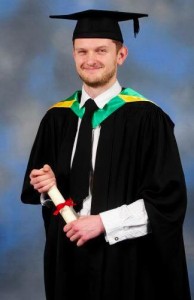Asperger’s and Journalism – My Journey
My own path towards a career in journalism has not been straightforward, to say the least. As an individual who, aged 18, was diagnosed with Asperger’s syndrome, a form of autism, I can appreciate the difficulty that people like myself will encounter within a demanding and challenging profession such as journalism.
By Thomas Hewitt
My own path towards a career in journalism has not been straightforward, to say the least. As an individual who, aged 18, was diagnosed with Asperger’s syndrome, a form of autism, I can appreciate the difficulty that people like myself will encounter within a demanding and challenging profession such as journalism. But in my opinion, it is easier to achieve your goal as a journalist if you can put your mind to, and work extremely hard to, improve your social communication, concentration skills and spatial awareness.
Being a journalist on the autism spectrum has felt like I have had to encounter and overcome various obstacles thrown at me in order to feel more comfortable and at ease during the engagements within my profession. Interviewing established figures such as politicians, as well as members of the public, has proven to be both a challenging and exhilarating endeavour to partake in. Whilst during a previous interview with a councillor from my local constituency, I noticed that my interviewee would not purposely answer some of my questions that were related to a particular subject, which the councillor had deemed inappropriate. However, I am continually acquiring the understanding that some of the people I interview for stories, do not always respond when you need their answers for a particular angle of your story. Therefore, I have managed to develop a ‘thick skin’ while reporting on certain news stories, as it is paramount to keep your emotions in check and report as professionally as possible.
People with Asperger’s Syndrome also have very fixated interests which we can focus on for long periods of time. However, I have learnt to keep my own interested subjects away from general conversations, particularly in journalism, where you have to keep moving from subject to subject. A perfect example of this would be during my placement at Notts County Football Club, where I was tasked with reporting and updating match events. I had to be impartial and engaging towards my target audience, and not be tempted into expressing my own views on the ongoing match itself. We are defined by our tendencies to stick to routines and certain regimes, as well as our ability to adapt to changes such as relocation.
I would have never expected myself to be in this promising position that I am in at this moment in time. I am currently studying a year long Masters Degree in Newspaper Journalism at Nottingham Trent University, as well as contributing on a regular basis to my local newspaper publications, (the Nottingham Post and Clifton Local News.). I have also been fortunate to build up a wide range of valuable contacts within the profession, which I am sure will prove to be useful in my future efforts.
Getting outside your comfort zone is a great way of honing your craft as a journalist with autism. There have been many times when I have written outside of my comfort zone, such as in court and reviewing for publications, and learned a lot of new skills that otherwise I would not have known beforehand.
One of the best pieces of advice I can give to others on the autistic spectrum who are contemplating becoming a journalist is to just be yourself. Speak up for who you are and stand up as a person. Journalism is a challenging profession, and there will be times when it may get tough. However, stick to your own philosophies and listen to your peer’s advice and always be impartial.



